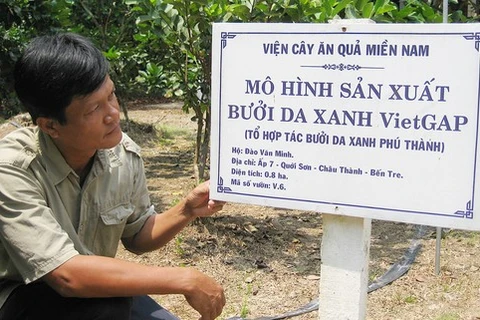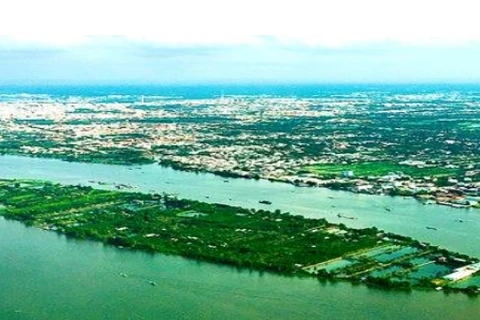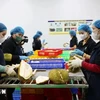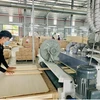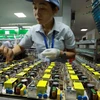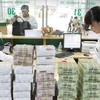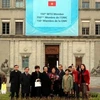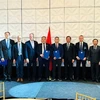Can Tho (VNA) - The agricultural sector has grown but was still not strong enough to revive the region's economy, according to the second annual Mekong Delta Economic Report 2022 released in Can Tho city on August 1.
The launch of the report was held by the Vietnam Chamber of Commerce and Industry (VCCI)’s Branch in Can Tho and the Fulbright School of Public Policy and Management (FSPPM) with the participation of experts in the fields of economics, policymaking, agriculture, environment, energy, transport and logistics, aiming to provide information on the economic situation of the Mekong Delta and important issues facing the region.
This is the second year the report has been published, and it remains the only report on an economic region across the country. The theme "Transformation of development models and integrated planning" focuses on the transformation of the agricultural model and assessing the impact of the Mekong Delta Integrated Plan for the 2021-2030 period.
VCCI Chairman Pham Tan Cong said: "The Mekong Delta is known for its rich land and abundant labour resources. The main economic pillar comes from the agricultural industry but it is facing great challenges due to climate change, economic decline, labour shortages and raw material sources that do not meet export standards.”
Cong said while the key processing industry relied heavily on raw materials, the region must find an answer for sustainable development if it continues to rely on natural conditions.
He said: “The business community needs to grasp and approach systematic and synchronous development orientations and strategies.”
The report gave an overview of the current status of the global economy "post-COVID-19", the local macroeconomic situation and the economic impacts on the Mekong Delta.
Vu Thanh Tu Anh, FSPPM’s director, co-editor and head of the research team, said two years of the pandemic had a heavy impact on local economic growth but the biggest bright spot of the Mekong Delta was the agriculture sector.
Anh said the agricultural sector of the Mekong Delta still grew 3.4%, much higher than the national average in 2021, adding the region's agricultural and aquatic exports played a key role in maintaining Vietnam's trade surplus.
Anh noted that the agricultural competitiveness of the Mekong Delta did not only come from favourable natural conditions for agricultural production, but also from technical improvements to increase productivity and the process of agricultural production and economic restructuring.
Anh said unlike other regions, the average agricultural labour productivity growth rate in the Mekong Delta was very high, up to 9.03% per year, which is more than two times higher than that of the industrial (4.39%) and services sector (3.82%), showing great potential for structural transformation and productivity growth.
Anh said though agricultural development was an important prerequisite for industrial and service development, in the long term, economic growth and prosperity did not come from agriculture but from structural transformation in industry and services. Therefore, clearly identifying and gradually removing bottlenecks hindering the industrial and service development of the Mekong Delta would be necessary for development.
The report also showed the delta was facing a serious lack of investment and labour under the shift from agriculture to industry, adding the matter was created from the economic structural spiral.
In such a context, the report suggested breaking some links of the economic structural spiral in terms of socio-economy and environment to help the Mekong Delta transform its economic development model and raise people's incomes in a sustainable way.
Attending the launch of the report, Caitlin Wiesen, UNDP Resident Representative, said as climate change would transform agriculture in the Delta, adjustment to climate change would inevitably take place through markets as land and housing in some places become more expensive and in other places loses value due to flooding, saline intrusion and other factors.
She said as changing ecosystems result in migration on a large scale, it was important to avoid controlling the movement of populations, and instead facilitate migration to places that can offer good jobs, decent, resilient housing and essential public services through the use of incentives, including the construction of affordable housing in industrial zones and in areas with thriving agriculture sectors.
Wiesen said 41% of the labour force in the region were employees, but a more complete tally of migrants would probably yield a higher figure, adding: "Given that half of the region’s labour force works for wages, the creation of productive, sustainable jobs is the key to climate change adaptation that leaves no one behind.”
She suggested additional public investment should be accompanied by greater efficiency in planning and implementation, avoiding duplication, delays and cost overruns that have held back infrastructure development in the region.
She added: “It is important to increase the supply of domestic long-term finance, especially ones with advanced technology and capital equipment. There are many useful models on the use of public banks in developing and advanced countries to stimulate private sector lending through partial guarantees, structured finance and even equity stakes in new ventures.”
The UNDP also suggested encouraging new models of agricultural transformation in the region which will continue to be a major rice producer and shift into higher value-added commodities, including fish and shellfish, fresh produce for export and for Vietnam’s growing cities in the future.
On the other hand, she said: “The Government will play an important role in stimulating innovation, creating incentives to encourage sustainable practices, regulating the use of pesticides and overuse of chemical fertilisers, building public infrastructure and reducing logistics costs.”
Currently, the UNDP has been providing technical assistance and support to provincial authorities and vulnerable communities in coping with the impacts of disasters, climate change, and COVID-19 in the Mekong Delta./.
The launch of the report was held by the Vietnam Chamber of Commerce and Industry (VCCI)’s Branch in Can Tho and the Fulbright School of Public Policy and Management (FSPPM) with the participation of experts in the fields of economics, policymaking, agriculture, environment, energy, transport and logistics, aiming to provide information on the economic situation of the Mekong Delta and important issues facing the region.
This is the second year the report has been published, and it remains the only report on an economic region across the country. The theme "Transformation of development models and integrated planning" focuses on the transformation of the agricultural model and assessing the impact of the Mekong Delta Integrated Plan for the 2021-2030 period.
VCCI Chairman Pham Tan Cong said: "The Mekong Delta is known for its rich land and abundant labour resources. The main economic pillar comes from the agricultural industry but it is facing great challenges due to climate change, economic decline, labour shortages and raw material sources that do not meet export standards.”
Cong said while the key processing industry relied heavily on raw materials, the region must find an answer for sustainable development if it continues to rely on natural conditions.
He said: “The business community needs to grasp and approach systematic and synchronous development orientations and strategies.”
The report gave an overview of the current status of the global economy "post-COVID-19", the local macroeconomic situation and the economic impacts on the Mekong Delta.
Vu Thanh Tu Anh, FSPPM’s director, co-editor and head of the research team, said two years of the pandemic had a heavy impact on local economic growth but the biggest bright spot of the Mekong Delta was the agriculture sector.
Anh said the agricultural sector of the Mekong Delta still grew 3.4%, much higher than the national average in 2021, adding the region's agricultural and aquatic exports played a key role in maintaining Vietnam's trade surplus.
Anh noted that the agricultural competitiveness of the Mekong Delta did not only come from favourable natural conditions for agricultural production, but also from technical improvements to increase productivity and the process of agricultural production and economic restructuring.
Anh said unlike other regions, the average agricultural labour productivity growth rate in the Mekong Delta was very high, up to 9.03% per year, which is more than two times higher than that of the industrial (4.39%) and services sector (3.82%), showing great potential for structural transformation and productivity growth.
Anh said though agricultural development was an important prerequisite for industrial and service development, in the long term, economic growth and prosperity did not come from agriculture but from structural transformation in industry and services. Therefore, clearly identifying and gradually removing bottlenecks hindering the industrial and service development of the Mekong Delta would be necessary for development.
The report also showed the delta was facing a serious lack of investment and labour under the shift from agriculture to industry, adding the matter was created from the economic structural spiral.
In such a context, the report suggested breaking some links of the economic structural spiral in terms of socio-economy and environment to help the Mekong Delta transform its economic development model and raise people's incomes in a sustainable way.
Attending the launch of the report, Caitlin Wiesen, UNDP Resident Representative, said as climate change would transform agriculture in the Delta, adjustment to climate change would inevitably take place through markets as land and housing in some places become more expensive and in other places loses value due to flooding, saline intrusion and other factors.
She said as changing ecosystems result in migration on a large scale, it was important to avoid controlling the movement of populations, and instead facilitate migration to places that can offer good jobs, decent, resilient housing and essential public services through the use of incentives, including the construction of affordable housing in industrial zones and in areas with thriving agriculture sectors.
Wiesen said 41% of the labour force in the region were employees, but a more complete tally of migrants would probably yield a higher figure, adding: "Given that half of the region’s labour force works for wages, the creation of productive, sustainable jobs is the key to climate change adaptation that leaves no one behind.”
She suggested additional public investment should be accompanied by greater efficiency in planning and implementation, avoiding duplication, delays and cost overruns that have held back infrastructure development in the region.
She added: “It is important to increase the supply of domestic long-term finance, especially ones with advanced technology and capital equipment. There are many useful models on the use of public banks in developing and advanced countries to stimulate private sector lending through partial guarantees, structured finance and even equity stakes in new ventures.”
The UNDP also suggested encouraging new models of agricultural transformation in the region which will continue to be a major rice producer and shift into higher value-added commodities, including fish and shellfish, fresh produce for export and for Vietnam’s growing cities in the future.
On the other hand, she said: “The Government will play an important role in stimulating innovation, creating incentives to encourage sustainable practices, regulating the use of pesticides and overuse of chemical fertilisers, building public infrastructure and reducing logistics costs.”
Currently, the UNDP has been providing technical assistance and support to provincial authorities and vulnerable communities in coping with the impacts of disasters, climate change, and COVID-19 in the Mekong Delta./.
VNA

